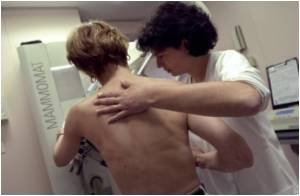Breast cancer cells regulate many genes at once in response to the hormone estrogen, resulting in the silencing of 14 genes at one time.

Tim H.M. Huang and Pei-Yin Hsu discovered the DNA looping event in a breast cancer cell line gene cluster at chromosome region 16p11.2.
They validated the finding using normal human breast epithelial cells and two animal models.
In addition, they used the normal-cell model to determine if long-term exposure to nine estrogen-like chemicals can initiate gene silencing through this mechanism.
These chemicals included diethylstilbestrol, two thalates and bisphenol A (BPA).
The suppressive effects varied in normal cells.
Advertisement
The findings suggest that continuous exposure to estrogen-like compounds might lead to permanent silencing of genes located in this conserved cluster, said Huang.
Advertisement
"But in breast cancer cells, there is no coordinated transcription site pairing, the DNA loops become tangled and the entire gene complex shuts down in a dead knot."
In some cases, Huang says, this multi-gene regulatory mechanism can increase gene expression and oncogenic activity, and further contribute to cancer development.
"We offer a new concept in this paper for the collective regulation of gene transcription. We found that in normal breast cells, DNA looping is more flexible and brings different promoters together temporarily. But in cancer, this complex just locks up and causes long-term suppression," said Hsu.
"Overall, our study shows that certain regions of the genome are silenced because the DNA has lost flexibility, and that this inflexible DNA status might be a good marker for studying environmental exposure to estrogen-like compounds," added Hsu.
The study is published in the journal Genome Research.
Source-ANI














